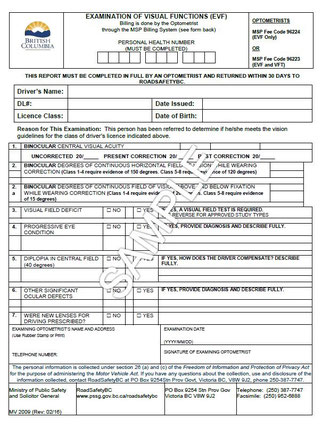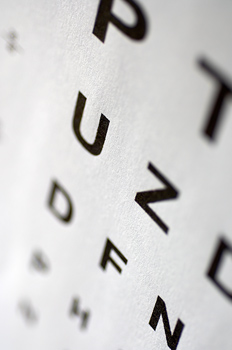- Ohio Drivers Eye Exam Chart Pdf
- Ohio Drivers Eye Exam Chart Online
- Ohio Drivers Eye Exam Chart Template
Jessica Jones, Ohio 'These practice test really helped, especially the third practice test. It had identical questions to the actual temp test. I passed my temp test the first time!' Dar’Nae Jones, Ohio 'I took my test the first time and I failed because a lot of the stuff in wasn't in the book. An example of the Landolt C eye chart (also known as the Japanese eye chart.) Numerous types of eye charts exist and are used in various situations. For example, the Snellen chart is designed for use at 6 meters or 20 feet, and is thus appropriate for testing distance vision, while the ETDRS chart is designed for use at 4 meters.
Patients
Eye charts can be configured in various ways, but generally, if during an eye test you can read the big E at the top but none of the letters lower than that, your vision is considered 20/200. That means you can read at 20 feet a letter that people with 'normal' vision can read at 200 feet. The third line is equivalent to 20/40, it is the driver’s test line. You must be able to read most of the letters on this line in order to obtain an unrestricted drivers license in most states including Ohio. The bottom three lines represent 20/30, 20/20 and 20/10.
Searching for a free eye chart to check your vision at home?
Simply click on the image to the right, and your download will begin. You can use this eye chart to check your entire family's vision.
Remember: This is not a substitute for a complete medical eye exam by a licensed optometrist. But it could help you identify potential vision problems that demand professional attention.
Ohio Drivers Eye Exam Chart Pdf
Need the JPEG version? Click here.
How to Use the Eye Chart
- Print the free eye chart on regular 8 1/2 x 11-inch paper
- Tack or tape the chart to a windowless wall in a well-lit room at eye level
- Measure ten feet from the wall
- Cover one eye (if you wear glasses for distance vision, keep them on)
- Have another person point to each line as you read the letters out loud and keep track of which letters you get right
- Continue to the bottom row or until you can no longer read the letters
- Write down the number of the smallest line where you identified the majority of letters correctly (Ex. If you were able to read 5 out of 8 letters on line 8, you would write 20/20.)
- Cover the other eye and repeat steps 5-7
What Do the Results Mean?

That depends on the age of the person being tested. A 3- to 4-year-old should be able to read the 20/40 line, and a 5-year-old the 20/30 line. Older children and adults should be able to read the majority of letters on the 20/20 line.
/Snellen_chart-7d82f27667194a91959b5ef2682d0a19.jpg)
If you notice any results that fall outside these standards, be sure to schedule an eye exam with your Vision Source doctor.
Testimonials
“The thing that I would tell people about Vision Source is that the people that work there are really sweet and they have the patience to help you and they're very helpful.”
BrittanyRecent Posts
Sunglasses Versus UV Rays
May 17, 2021
What’s Inside the Human Eye?
May 10, 2021
Connect With Us
Stay connected with everything new here at Vision Source:
It’s time for your driver’s license renewal, and you may be a little worried about passing the DMV vision test. Maybe your eyesight isn’t quite as good as it used to be, or you might have to squint to see objects far away. Perhaps you got a new pair of glasses, and you wonder if it will help you pass the test with flying colors. Here is some insight that can help you in your query of how beat the eye test at the dmv.
Over 9000 American Men and Women Improved their Vision uptill now
How the DMV Vision Test Works
When a person goes to the license bureau to get their new license, they will have their vision tested. The first test given is of letter or numbers that start out large and get smaller on each line towards the bottom. This test is similar to one you receive in an optometrist’s office.
The person being tested will read aloud the letters or numbers to determine how well they can see. The system tallies the results and gives a score with a top and bottom number just like at the doctor’s office, such as 20/20 or 20/40.

Top rated Vision supplement of 2020 – Recommeded by 5 Top Specialists – 100 Positive reviews
The second test involves staring into a machine and watching for a flashing light that moves around. It moves from the front to the side of the dmv vision test machine and the goal is to test your peripheral vision. In practical use, it tells how well you can see cars and lights from the side.

What is a Passing Grade?
Ohio Drivers Eye Exam Chart Online
Once you have completed the test with the vision screener, you receive a grade. Each state has its own requirements as to whether you pass or not and what happens if you don’t pass.
The standard rule for passing this dmv vision test machine test and being able to get your driver’s license is 20/40 in either or both eyes. This may be accomplished with or without glasses or corrective lens. If the test is outside this score but still within a safe range, the person may get a restricted license. The restrictions and permissible scores vary by state.
For example, a restricted license may be granted as long as the vision is between 20/50 and 20/70. The restrictions may include driving only during daylight or not driving during inclement weather or at maximum speed. A driving test may be required in some states and the limitations may be even more restrictive. For example, the restrictions may limit the person to driving to the grocery store or doctor’s office.
Ohio Drivers Eye Exam Chart Template
The person getting a license must go to an optometrist/ophthalmologist for correction to the vision if they fail the test. The doctor will test the vision with their own equipment and determine if they need to prescribe corrective lenses before the person can retake the driver’s license vision test again.
The vision test is an important part of getting or renewing a driver’s license, but it shouldn’t be a scary one. It alerts you to any issues you may have with your vision so you can drive safely and see where you’re going.